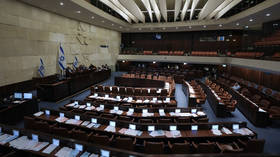Parliament votes to dissolve itself amid major crisis

Israel’s parliament, the Knesset, voted to dissolve itself on Thursday, meaning the Jewish state will hold its fifth election since 2019 later this year.
The 92-0 vote ended the premiership of Naftali Bennett, which became one of the shortest in the country’s history. He was only sworn in as prime minister on June 13, 2021.
From midnight, Bennett will be replaced as prime minister by foreign minister and alternate prime minister, Yair Lapid. The two ruling coalition partners symbolically switched their seats in the Knesset after the vote.
The new legislative election has been scheduled to take place in Israel on November 1, a date preferred by the government.
Bennett had already announced on Wednesday that he wasn’t going to run for re-election, saying it was “time to step back a little” for him and “look at things from the outside.”
The lawmakers decided to disperse last week, but it took the coalition and the opposition time to agree on a date for the new vote and the fate of some key pieces of legislation.
Eventually, they couldn’t find common ground on the subject of a subway system for Tel Aviv and another draft bill, which is crucial for advancing Israel on its way to obtaining visa-free travel to the US.
The coalition of eight political parties of various views, including the pro-Palestinian United Arab List (UAL or Ra’am), joined forces last year to depose long-time right-wing prime minister Benjamin Netanyahu.
However, working together effectively as a government turned out to be problematic for them. And, last week, Bennett and Lapid announced plans to dissolve the cabinet.
The decision was triggered by the failure of the Knesset in early June to pass a bill that would extend legal rights to settlers in the occupied West Bank for another five years. Two coalition members joined the opposition in refusing to support the bill to expedite the dissolution, putting Israel at risk of an unprecedented legal debacle.
The dissolution of parliament now means Israeli legal rights for settlers will be automatically extended for another six months.
The coalition government will continue to execute its duties until the election, in which Netanyahu will be favorite to become prime minister, according to polls.
A survey published by Radio 103 FM on Tuesday suggested that the opposition leader and his bloc would win 59 of 120 seats in the Knesset. This would make Netanyahu the winner, but still would not be enough for him to gain a majority and form a government.














